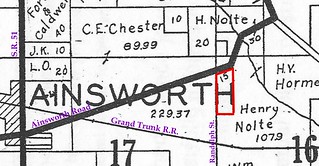
(Click on image to enlarge)
Fred Yager's farm is outlined in red on this map from the 1926 Plat Book.
Fred Yager lived on a little parcel of land on the southeast corner of the T-intersection of (present-day) Ainsworth Road and Randolph Street. That land had been in the Yager family as early as 1891, either coming down from his father, who died in 1887, or initially bought by his older brother (both were named Jacob).
It wasn't much — just 15 acres tucked in between the more impressive spreads of Henry Chester and Henry Nolte. You weren't likely to get rich on 15 acres, and even as a landowner Fred apparently hired himself out for day labor.
Around 1907 he landed a steady job as an engineer at the Hobart light and water plant. Every two weeks he took home $35, and by his own account handed every last cent of it over to his wife, Anna.
They had been married in 1905. Somehow their courtship had first begun by correspondence; eventually he traveled to her home in Aurora, Illinois, where they became engaged. It was her third marriage: of the two before, one ended in divorce, the other in death. But Fred didn't care about any of that. He seemed determined to make the third time the charm for Anna. He handed his paycheck over to her; he took her widowed father into his home; he indulged her mania for collecting (she had over 4,000 postcards from around the world). In the summer of 1910 he took her on a pleasure trip through northwest Indiana, into Chicago, and on a cruise across Lake Michigan.
He would soon prove to be a more indulgent husband than anyone could reasonably expect.
Somehow it came to Fred's attention that Anna had developed a habit of entertaining a visitor while he was at work. A certain bachelor in the neighborhood was coming to their house, sometimes taking Anna out driving in a buggy or walking in the woods, or even to dances and shows.
I don't know how all this came to Fred's attention. I expect he was clued in by observant neighbors. His closest neighbors, the Noltes, were a quiet, respectable family, and with an unmarried daughter in the household, Henry Nolte père would not have been indifferent to flagrant impropriety going on next door.
Whatever the source of his information, by the early spring of 1911, Fred could no longer doubt that his wife had a lover — and yet he went to work every day, knowing what Anna would get up to in his absence; and yet he came home and dutifully handed her his paycheck every two weeks.
On Thursday, March 30, 1911, Fred went to work as usual. Late in the afternoon he got a phone call advising him that strange things were going on in Ainsworth. Anna had spent the day packing up the Yager household, and then hired someone to haul it all to the Grand Trunk depot, leaving everything there under her father's name with instructions to ship it to Aurora, Illinois. As for Anna herself, she and her father had already left on a westbound passenger train. Fred hurried home to see for himself. He found the house bare except for a stove, bed and table, and a few dishes.
Now this was beyond endurance!
He returned to Hobart and hired attorney Roscoe R. Peddicord to start proceedings to recover his furniture. The next morning, a deputy sheriff seized the household goods (which were still at the Ainsworth depot awaiting shipment) and hauled them back to the Yager house. At a hearing the following Monday, Fred won possession by default judgment, since Anna did not show up.
Fred seemed less heartbroken than relieved to be through with indulging her. If only she'd waited two more days to leave him, he said, she would have had another $35 to travel on; but now his paycheck was his own, and in his opinion he had "much to gain and little to lose through the affair."
But his subsequent behavior showed that he did not accept the loss of his wife as calmly as his philosophical remarks would suggest. Adultery was then a crime, and Fred wanted his wife and her lover hunted down and brought to justice. He and his attorney asked Marshal Fred Rose of Hobart to get on the case.
In reporting this story, the Gazette noted that Fred "hesitate[d] not in naming" his wife's lover, but the newspaper wisely withheld the man's name. There was no proof — yet.
[To be continued]
Sources:
♦ "$2,000 Asked For Alimony." Hobart News 15 June 1911.
♦ 1891 Plat Map.
♦ 1900 Census.
♦ 1910 Census.
♦ "Ainsworth Pick-Ups." Hobart Gazette 7 Oct. 1910.
♦ "Local Drifts." Hobart Gazette 22 July 1910.
♦ "Loses His Wife." Hobart Gazette 7 Apr. 1911.


2 comments:
What a story! And we always think that events like this didn't happen in the "good old days"! Can't wait to read the ending.
When I got out of high school and started reading history from sources other than school-approved textbooks, it was a real revelation to me to learn that -- even before 1970 -- people occasionally had sex outside of marriage! :D
Post a Comment